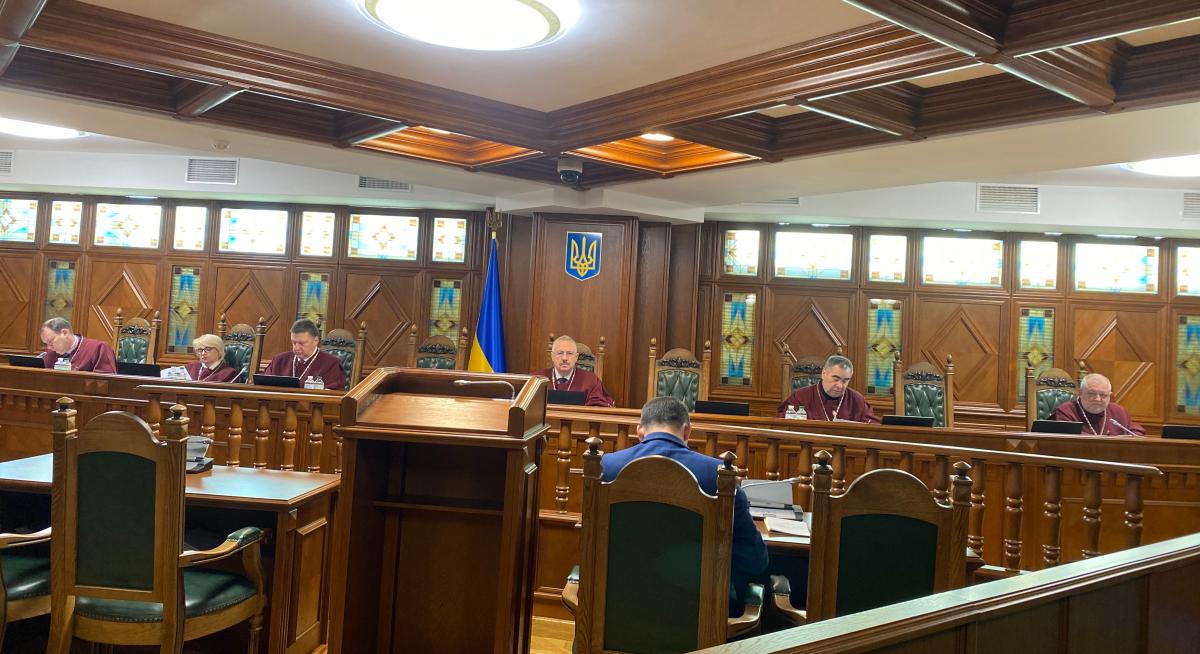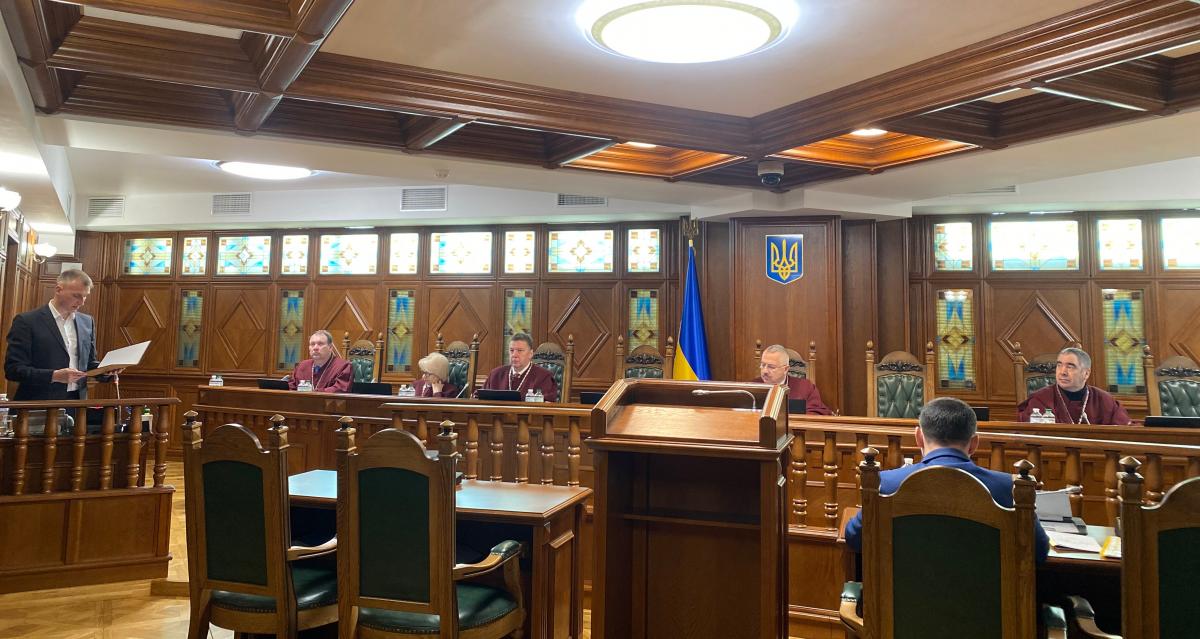On April 19, 2023, the Second Senate of the Constitutional Court of Ukraine, at the public part of the plenary session in the form of written proceedings, deliberated the case upon the constitutional complaint of Ivan Sapsai regarding the constitutionality of the provisions of paragraph 19.2 of Section II “Final and Transitional Provisions” of the Law of Ukraine “On Amending Certain Legislative acts regarding the Immediate Measures of the Prosecution Service Reform” dated September 19, 2019 No. 113-IX in the wording before introducing amendments by the Law of Ukraine “On Amendments to Section II “Final and Transitional Provisions” of the Law of Ukraine “On Amending Certain Legislative Acts regarding the Immediate Measures of the Prosecution Service Reform” on Certain Aspects of the Effect of Transitional Provisions” dated June 15, 2021 No. 1554-IX (hereinafter referred to as “Law No. 113”) in systematic conjunction with Article 51.1.9 of the Law of Ukraine “On the Prosecution Service” dated October 14, 2014 No. 1697-VII (hereinafter referred to as “Law No. 1697”).
During the plenary session, the judge-rapporteur in the case - judge of the Court Vasyl Lemak noted that the author of the complaint asked to examine the disputed provisions of the Law No. 113 and the Law No. 1697 for compliance with Article 3.2.1, Article 3.2.3, and Article 43.2 of the Constitution of Ukraine.
According to paragraph 19 of Section II “Final and Transitional Provisions” of Law No. 113, prosecutors who, on the date of entry into force of the Law No. 113, hold positions in the General Prosecutor's Office of Ukraine, regional prosecution offices, local prosecution offices, military prosecution offices, are dismissed by the Prosecutor General, the head of the regional (oblast) prosecution office from the position of prosecutor on the basis of Article 51.1.9 of the Law of Ukraine “On the Prosecution Service”, provided that one of the following reasons is met: “decision of the personnel commission on the unsuccessful passing of the certification by the prosecutor of the General Prosecutor's Office of Ukraine, regional prosecution office, local prosecution office, military prosecution office” (subparagraph 2).
In pursuance with Article 51.1.9 of Law No. 1697, the prosecutor is dismissed from his/her position in the event of: “liquidation or reorganization of the prosecution office in which the prosecutor holds office or in the case of a reduction in the number of prosecutors of the prosecution office”.
According to the author of the complaint, the contested provisions do not correspond to a number of norms of the Constitution of Ukraine, and their application led to the violation of his constitutional right to work, which is guaranteed by Article 43.2 of the Basic Law of Ukraine.
The judge-rapporteur also informed that in order to ensure a comprehensive and objective deliberation of the case and to deliver a reasoned decision by the Court, he prepared requests to state authorities, academic institutions, establishments of higher education to express opinions on the issues raised in the constitutional complaint.
The Second Senate examined the case files in the public part of the plenary session and proceeded to the in-camera part for a decision.
***
The Second Senate of the Constitutional Court of Ukraine on the same day, in the public part of the plenary session, in the form of written proceedings, deliberated the case upon the constitutional complaint of Serhii Vashchenko regarding the compliance of Article 361.5.1 of the Code of Administrative Procedure of Ukraine (hereinafter referred to as “the Code”) with the Constitution of Ukraine.
During the plenary session, the judge-rapporteur in the case - judge of the Constitutional Court of Ukraine Vasyl Lemak informed about the substantiation of the applicant and the course of deliberation of the case in the courts.
The judge-rapporteur noted that Serhii Vashchenko appealed to the Constitutional Court of Ukraine to examine the compliance of Article 361.5.1 of the Code, according to which the basis for reviewing court decisions in view of the exceptional circumstances is “established by the Constitutional Court of Ukraine unconstitutionality (constitutionality) of the law, other legal act or their specific provision, applied (not applied) by the court when deciding the case, if the court decision has not yet been executed” with Article 24.1, Article 55.1, Article 55.2, Article 55.4, Article 129.2.1, Article 129.2.8, Article 151-1 of the Constitution of Ukraine.
From the content of the constitutional complaint and the materials attached to it, it follows that the courts refused to satisfy Serhii Vashchenko’s claim regarding non-payment of one-time severance pay in the amount of 10 monthly wages for his last position.
Delivering such court decisions, the courts of the judicial system of Ukraine proceeded from the fact that in accordance with paragraph 28.1 of Section II of the Law of Ukraine “On Prevention of Financial Disaster and Creation of Prerequisites for Economic Growth in Ukraine” dated March 27, 2014 No. 1166-VII (hereinafter referred to as “Law No. 1166”), which became effective on April 1, 2014, Article 136, part 1 of which established the right of a retired judge to payment of severance pay in the amount of 10 monthly wages for the last position, was excluded from the Law of Ukraine “On the Judiciary and the Status of Judges” dated July 7, 2010 No. 2453-VI.
The Constitutional Court of Ukraine, by its Decision No. 2-r(II)/2020 dated April 15, 2020, declared the provision of paragraph 28.1 of Section II of Law No. 1166 as such that does not comply with the Constitution of Ukraine (is unconstitutional).
In this regard, Serhii Vashchenko appealed to the courts for a review of the decision in his case under exceptional circumstances, but the courts of the Ukrainian judicial system refused the complainant to grant his application.
According to the subject of the right to constitutional complaint, Article 361.5.1 of the Code does not correspond to a number of norms of the Constitution of Ukraine, since it enables the right to review a court decision only for that category of persons in whose case the court decision has not yet been executed, and at the same time deprives those persons whose decision has been executed or is such that it does not provide for compulsory execution of such a right.
The author of the complaint believes that such a ban leads to procedural discrimination of the participants in the court process, limits the right to judicial protection and the filing of a constitutional complaint, since it “deprives the party of the rational sense to appeal to the Constitutional Court of Ukraine with a constitutional complaint, and therefore the norms of the Constitution of Ukraine, which provide for such a right, acquire declarative and formal features”.
During the plenary session, the judge-rapporteur also informed that in order to ensure a comprehensive and objective deliberation of the case and to deliver a reasoned decision by the Court he had made inquiries to state authorities, academic institutions, establishments of higher education to express their opinions on the issues raised in the constitutional complaints.
After studying the case files in the public part of the plenary session, the Court proceeded to the in-camera part for a decision.
The Permanent Representative of the Verkhovna Rada of Ukraine in the Constitutional Court of Ukraine Maksym Dyrdin attended the plenary sessions.
Public parts of plenary sessions are available on the official website of the Court in the section “Archive of Video Broadcasts of Sessions”.



